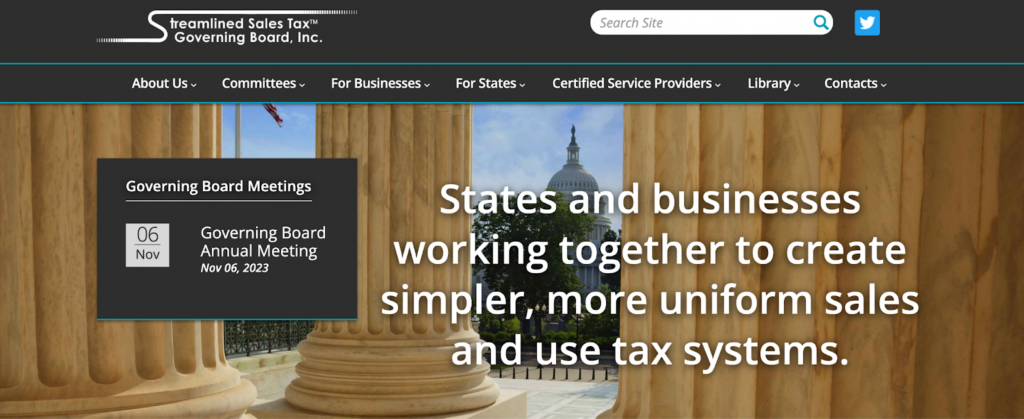For any business operating within the United States, managing how sales tax is charged and collected is an important part of navigating the tax system.
While the concept of sales tax is relatively simple, variable taxation rates between states, which differ depending on the goods being sold, means sales tax calculation is a complicated business process to contend with.
However, this aspect of payment processing is addressed in part by the Streamlined Sales and Use Tax Agreement (SSUTA). This article explores what you need to know about Streamlined Sales Tax (SST).
TL;DR
- The stated purpose of the SSUTA is to improve sales tax administration by simplifying tax law.
- There are 24 states that have conformed to the SSUTA and are full member states by having changed sales tax laws to meet all requirements set by the Act.
- Sellers can register to participate in the SSUTA by using the Streamlined Sales Tax Registration System (SSTRS), which then administers a permit to collect, remit and use sales tax in the selected states.
What is the Streamlined Sales Tax (SST)?
The SSUTA consists of 44 states within the U.S, the District of Columbia, local governments and stakeholders in the business community seeking to simplify how sales tax is collected, used and administered.
Essentially, the SSUTA’s purpose is to minimize cost and reduce the burden of administration for retailers that collect sales tax. The SST project is beneficial to retailers operating in multiple states where tax rates are variable, making a more cohesive tax collection process for the business.
How did the Streamlined Sales Tax Project Start?
The SSUTA got its start with the National Governor’s Association (NGA) and the National Conference of State Legislatures (NCSL) in the fall of 1999. A key driver for this initiative was due to the sheer amount of tax revenue collected via sales tax—which is according to the U.S. Census, 33% of state tax collections, coming in second only to personal income tax.
Starting with the concern the sales tax laws passed in the 1930’s would not hold up in the modern era, the Advisory Commission on Electronic Commerce was created, of which the NGA and NCSL are members. Together, these entities created the Internet Tax Freedom Act which resulted in governors from across the U.S. directing state tax administrators to develop a simple and business-friendly system for collecting sales tax.
There are 24 states that have conformed to the SSUTA and are full member states by having changed sales tax laws to meet all requirements set by the Act. Those states are:
- Arkansas
- Georgia
- Indiana
- Iowa
- Kansas
- Kentucky
- Michigan
- Minnesota
- Nebraska
- Nevada
- New Jersey
- North Carolina
- North Dakota
- Ohio
- Oklahoma
- Rhode Island
- South Dakota
- Tennessee
- Utah
- Vermont
- Washington
- West Virginia
- Wisconsin
- Wyoming
There are other states in progress of conforming their laws to adhere to the SSUTA but the official enactment is not complete yet. Tennessee is considered an associate member and is in compliance with nearly all parts of the SSUTA.
Benefits of SST
The stated purpose of the SSUTA is to improve sales tax administration by simplifying tax law. This creates more efficient administrative procedures and leverages emerging technologies.
Article 1, Section 102 of the SSUTA states the intended benefits of this Act. Among others, some of the top benefits are:
- Simplification of sales tax administration
- Reduction of compliance costs
- Uniformity for state and local tax definition and tax bases
- Simplified sales tax returns and tax remittances
- Consumer privacy protection
SST Registration and Eligibility
To register for the Streamlined Sales Tax (SST) program, businesses must meet certain eligibility requirements. The SST program is designed to simplify sales and use tax compliance for businesses selling into multiple states without a physical presence, also known as economic nexus. To qualify, businesses must:
- Meet the economic nexus threshold, which varies by state
- File all required tax returns and remit all required tax payments
- Not have any outstanding tax liabilities or penalties
- Not have been convicted of a tax crime
Businesses that meet these requirements can register for the SST program through the Streamlined Sales Tax Governing Board’s website. The registration process typically involves providing business information, such as the business name, address, and tax identification number, as well as information about the business’s sales and use tax activities.
Once registered, businesses can take advantage of the SST program’s benefits, including:
- Simplified sales and use tax compliance
- Reduced administrative burden
- Increased accuracy and efficiency in sales and use tax reporting
- Access to certified rates, boundaries, and tax codes updated automatically
By participating in the SST program, businesses can streamline their tax compliance processes, making it easier to manage sales tax obligations across multiple states.
SST Governing Board and Administration
The Streamlined Sales Tax Governing Board is responsible for administering the SST program. This non-profit organization is composed of representatives from participating states, local governments, and the business community. The Board’s primary goal is to simplify and modernize sales and use tax administration, making it easier for businesses to comply with sales and use tax laws.
The Governing Board is responsible for:
- Developing and implementing the SST program’s policies and procedures
- Providing guidance and support to participating states and businesses
- Maintaining the SST program’s certified rates, boundaries, and tax codes
- Ensuring compliance with the SST program’s requirements and regulations
The Governing Board also works closely with local governments and the business community to ensure that the SST program meets the needs of all stakeholders. This includes providing education and training on the SST program’s requirements and benefits, as well as addressing any issues or concerns that may arise.
In addition to the Governing Board, the SST program also has a number of committees and working groups that focus on specific aspects of the program. These committees and working groups include:
- The Certification Committee, which is responsible for certifying rates, boundaries, and tax codes
- The Technology Committee, which focuses on the development and implementation of technology solutions to support the SST program
- The Education Committee, which provides education and training on the SST program’s requirements and benefits
Overall, the SST Governing Board and administration play a critical role in ensuring the success of the SST program and providing benefits to businesses and participating states. By working together, they help create a more efficient and effective sales tax system that benefits everyone involved.
How Does SST Work and How do I get Started?

Sellers can register to participate in the SSUTA by using the Streamlined Sales Tax Registration System (SSTRS), which administers a permit to collect, remit and use sales tax in the selected states. Businesses are required to complete SST registration in each state where they have a physical or economic nexus. Businesses can register directly with the state or through the SSTRS.
Sellers that register in the SSTRS also have the added benefit of being able to work with a Certified Service Provider (CSP) to assist with sales tax calculation, sales tax remittance, and preparation and filing of required sales tax returns made to the Streamlined States the business is registered with. The CSP works with the seller to provide software and services needed to correctly administer sales tax. Some businesses may also be eligible to receive free CSP services and can learn more on the Streamlined Sales Tax website.
Another role this CSP partnership and software usage can help reduce expenses and liability is by using software certified by the Streamlined Sales Tax Governing Board, it is generally immune from audit liability and the participating states pay the cost of services in many cases.
Worth noting is, sellers are not required to register for sales tax collection and remittance via the SSTRS and can register directly with the states in which they do business or where remote seller tax collection is required. However, if a business chooses to register manually with each state, they do not benefit from the services offered by the SSTRS.
Challenges and Criticisms of SST
One of the nuances of sales tax compliance concerns “remote sellers”, which are defined as businesses that sell products or services into states where they do not have a physical presence, a common example of which is an eCommerce business with nationwide shipping and limited physical locations. For many years, retailers were not required to collect sales tax if there was no physical presence in the state where the product or service was delivered.
However, in June 2018, the U.S. Supreme Court issued a decision in the case South Dakota v. Wayfair, that states may require sellers to collect and conduct sales tax remittance to the state if there is an “economic nexus” in that state, even if there is no physical presence.
Some of the drawbacks are centered around 10 states where it can take a lot longer to gain access to your merchant account. Those states are: Georgia, Michigan, Minnesota, Nebraska, Nevada, New Jersey, North Carolina, Ohio, Vermont, and Wisconsin. In these states, application directly with the state results in access to your account within 24-48 hours, but registration through SST requires waiting for documentation to be mailed from the states and can take around 7-14 business days.
Further, some problems with sales tax permit issuance may be an issue because registration through SST doesn’t actually issue the sales tax permit. One example of this hiccup is when an exemption is needed for wholesalers, but they may not actually have the permit. However, some businesses are eligible for an exemption certificate which is accepted by all 24 streamlined states.
In Summary
All businesses have a lot of tax information to digest, with sales tax being just one aspect to navigate. It is likely that many more states will work towards membership of the SST given the rise of eCommerce and the SCOTUS ruling that has implications still being realized. Businesses with eCommerce or multi-state operations should consider the benefits of working with SST administrators in simplifying how sales tax is managed and to improve overall profits.
Tax governance is complicated, and the creation of the SST Act is meant to help businesses alleviate this burden. Partnership with a CSP is one useful step to help, and working with a tax professional to help your business stay compliant with tax laws will help you navigate the complexity of sales tax.
FAQs about Streamlined Sales Tax
Q: What is a Streamlined Sales Tax (SST)?
A Streamlined Sales Tax (SST) is a system designed to simplify the manner sales and use taxes are collected and administered. This system was created through the Streamlined Sales and Use Tax Agreement (SSUTA) in response to the varying tax rates across the U.S states.
Q: What is the purpose of the Streamlined Sales and Use Tax Agreement (SSUTA)?
The SSUTA aims to simplify tax laws, improve sales tax administration, and reduce the administrative burden for retailers collecting sales tax. It is a cooperative initiative between 44 U.S. states, the District of Columbia, local governments, and business stakeholders.
Q: How did the SSUTA come into existence?
The SSUTA was initiated by the National Governor’s Association (NGA) and the National Conference of State Legislatures (NCSL) in 1999. They created the Internet Tax Freedom Act, leading to the development of a simplified, business-friendly system for collecting sales tax.
Q: How many states have conformed to the SSUTA?
As of the latest update, 24 U.S. states have conformed and became full members of the SSUTA, having altered their sales tax laws to meet all SSUTA requirements. This list includes states such as Georgia, Michigan, Nevada, Rhode Island, Iowa, among others.
Q: What is the Streamlined Sales Tax Registration System (SSTRS)?
The Streamlined Sales Tax Registration System (SSTRS) is a platform where sellers can register to participate in the SSUTA. Once registered, they receive a permit to collect, remit, and use sales tax in the selected states.
Q: Who are remote sellers and how does SSUTA affect them?
Remote sellers are businesses selling products or services into states where they have no physical presence. The SSUTA affects them as post the South Dakota v. Wayfair Supreme Court decision; these sellers may now have to collect sales tax based on an “economic nexus”, even if their business lacks physical presence in the state.
Q: How does the SSUTA impact businesses?
The SSUTA simplifies sales tax administration, making it easier for businesses, especially those operating in multiple states, to manage sales tax. It also offers reduced compliance costs, uniform tax definitions, and simplified tax remittances. However, businesses need to be aware of potential delays in gaining access to their merchant accounts in certain states if they register through SST.
Q: What is a Certified Service Provider (CSP) in the context of the SSUTA?
A Certified Service Provider (CSP) is an entity that businesses can work with to help with sales tax calculation, sales tax remittance, and preparation and filing of required sales tax returns. Businesses can choose to partner with a CSP after they register via the SSTRS.
Q: What support does a CSP provide to a business that are registered in the SSTRS?
A CSP offers software and services necessary to correctly administer sales tax. It can help businesses reduce their expenses and liability, often making them immune from audit liability, and sometimes providing services free of cost.
Q: Who should consider engaging with the SSUTA?
Businesses operating in multiple states or running eCommerce ventures should consider the benefits of the SSUTA. Given the rise in online commerce and varying tax legislation across states, the SSUTA can help businesses simplify their sales tax management and remain compliant with tax laws.






